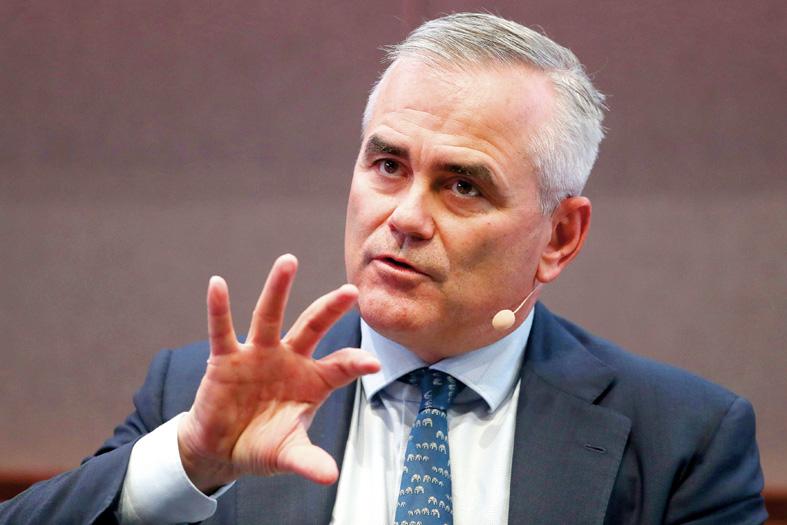Credit Suisse Group AG yesterday said that business in the fourth quarter so far has continued the trend of the previous three months, when the lender got a boost from advising on deals while trading revenue trailed peers.
The investment bank “continues to perform well,” with revenue higher than in last year’s fourth quarter, Credit Suisse said in a statement on its investor day.
In wealth management, stronger transactional business especially in Asia is offsetting headwinds from the stronger Swiss franc and negative interest rates, it said.

Photo: Reuters
The bank confirmed a target for a return on tangible equity of 10 to 12 percent in the medium-term and for capital distributions, while cautioning that reaching that goal next year would depend on provisions for bad loans.
Credit Suisse chief executive Thomas Gottstein is seeking to turn the corner after a series of setbacks overshadowed his first year in office, from loan losses to questionable dealings for a large client.
While he simplified the organizational setup, including at the securities unit, and started a review of the asset management business, he has been unable to stop a constant flow of bad news.
In the latest hit, an impairment on a hedge fund stake and potentially surging legal provisions threaten to affect fourth-quarter earnings.
Since Gottstein combined the investment banking and trading activities in one unit, the business has shown mixed results, with advisory doing well in the third quarter, while fixed-income trading — the largest revenue contributor — trailed peers.
The bank did not give any details on its trading performance so far this quarter.
The heads of the two largest US lenders, JPMorgan Chase & Co and Bank of America Corp, last week told investors that their investment-banking and trading divisions would notch a strong performance in the fourth quarter as economic activity stayed fairly resilient.
At Deutsche Bank AG, fixed-income trading grew 10 percent in October and 23 percent last month.
The COVID-19 pandemic also exposed some weaknesses in Credit Suisse’s asset management model, a business that is typically a source of stable income with little risk for the bank, but which suffered a number of fund implosions this year as well as a scandal involving one of its largest clients, Softbank Group Corp.
Credit Suisse said that it expects a significant turnaround at the unit next year.

South Korea’s equity benchmark yesterday crossed a new milestone just a month after surpassing the once-unthinkable 5,000 mark as surging global memory demand powers the country’s biggest chipmakers. The KOSPI advanced as much as 2.6 percent to a record 6,123, with Samsung Electronics Co and SK Hynix Inc each gaining more than 2 percent. With the benchmark now up 45 percent this year, South Korea’s stock market capitalization has also moved past France’s, following last month’s overtaking of Germany’s. Long overlooked by foreign funds, despite being undervalued, South Korean stocks have now emerged as clear winners in the global market. The so-called “artificial intelligence

‘SEISMIC SHIFT’: The researcher forecast there would be about 1.1 billion mobile shipments this year, down from 1.26 billion the prior year and erasing years of gains The global smartphone market is expected to contract 12.9 percent this year due to the unprecedented memorychip shortage, marking “a crisis like no other,” researcher International Data Corp (IDC) said. The new forecast, a dramatic revision down from earlier estimates, gives the latest accounting of the ongoing memory crunch that is affecting every corner of the electronics industry. The demand for advanced memory to power artificial intelligence (AI) tasks has drained global supply until well into next year and jeopardizes the business model of many smartphone makers. IDC forecast about 1.1 billion mobile shipments this year, down from 1.26 billion the prior

Chinese artificial intelligence (AI) start-up DeepSeek’s (深度求索) latest AI model, set to be released as soon as next week, was trained on Nvidia Corp’s most advanced AI chip, the Blackwell, a senior official of US President Donald Trump’s administration said on Monday, in what could represent a violation of US export controls. The US believes DeepSeek will remove the technical indicators that might reveal its use of American AI chips, the official said, adding that the Blackwells are likely clustered at its data center in Inner Mongolia, an autonomous region of China. The person declined to say how the US government received

FORTUNES REVERSED: The new 15 percent levies left countries with a 10 percent tariff worse off and stripped away the advantage of those with a 15 percent rate In a swift reversal of fortunes, countries that had been hardest hit by US President Donald Trump’s tariffs have emerged as the biggest winners from the US Supreme Court’s decision to strike down his emergency levies. China, India and Brazil are among those now seeing lower tariff rates for shipments to the US after the court ruled Trump’s use of the International Emergency Economic Powers Act to impose duties was illegal. While Trump subsequently announced plans for a 15 percent global rate, Bloomberg Economics said that would mean an average effective tariff rate of about 12 percent — the lowest since